Startup Spotlight: Impedyme Develops Scalable Power HiL, Motor, and Grid Emulation Systems for Hardware Prototyping
In a world rapidly transitioning toward electrification and smart energy systems, fast and flexible testing platforms are crucial. Startup company Impedyme Inc. is addressing high-power testing challenges head-on by developing powerful, scalable test and emulation solutions. With a mission to democratize Power Hardware-in-the-Loop (PHiL) testing, Impedyme equips engineers and researchers with the tools they need to bring advanced innovations, such as electric vehicles, eVTOLs, and renewable energy systems, to life faster than ever.
The Beginning of Impedyme: A Mission to Democratize Real-time Test and Emulation
Impedyme Inc. has a bold vision: to make multi-nodal power electronics test systems accessible to innovators across industrial and academic domains. Dr. Angelos Stavrou, CEO and Co-Founder, explains, “We’re on a mission to democratize CHP technology as an all-in-one solution across diverse industries that use high-power equipment, including EVs, aerospace, and renewables.” Stavrou goes on to say, “By lowering the barrier to entry without sacrificing scalability, we empower innovation in high-power energy and transportation systems worldwide.”
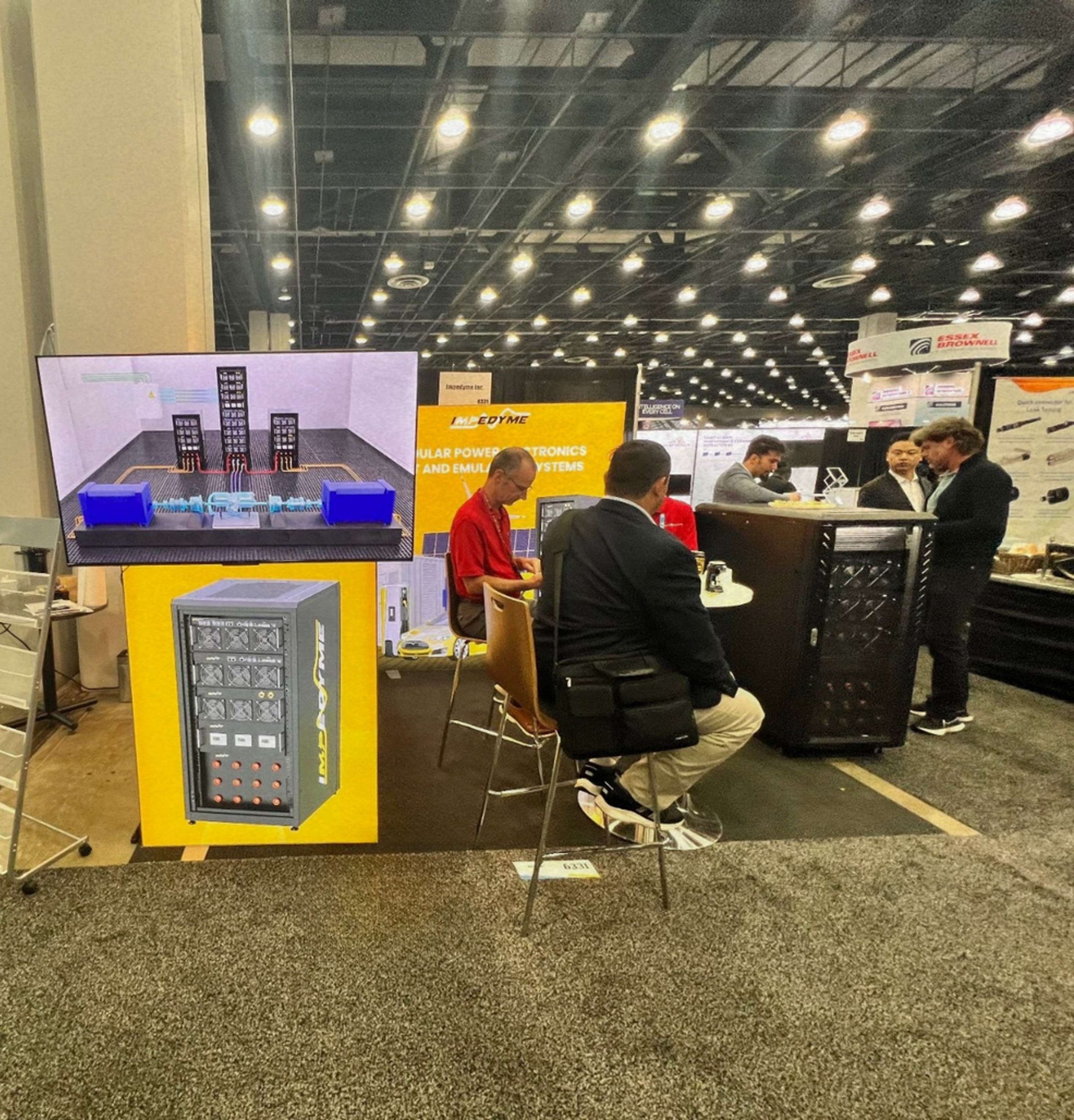
Impedyme CHP-Series Test and Emulation system showcased at The Battery Show 2024, Detroit MI (Image courtesy of Impedyme)
To achieve this goal, Impedyme developed a range of solutions to meet the needs of its customers.
Dr. Ash Kan, Director of Business Development, explains, “Up to now, real-time power hardware-in-the-loop (PHiL) testing of power electronics devices for both functionality and performance has been a pretty expensive and time-consuming endeavor.”
Indeed, real-time simulation systems can easily cost thousands of dollars, especially when a power amplifier is added. “Impedyme’s aim is to lower the cost of entry and enable customers to access turnkey solutions with software and hardware components tailored to a specific project, namely a wide range of real-time hardware-in-the-loop applications, including emulation support for motor, grid components, battery, to name a few,” says Kan.
During a project, the type and number of inputs and outputs signals, processing unit, number of electrical phases, and frequency bandwidth, for example, are designed according to the requirements of the intended device under test (DUT). Kan describes how these tailor-made solutions in the market can suffer from a drawback: If the requirements change, or if there is a parallel project to develop a different part of a powertrain, such as a traction inverter, battery pack, or on-board charger, which is typical for agile R&D teams, the test bench might need to be modified or upgraded. This can be highly costly and time-consuming, making it often impossible to reuse the existing hardware for a completely new application.
In many cases, budget shortages push teams to purchase a simple AC/DC power supply instead of an advanced Power HiL testbench for power testing. This shortcut can leave them with many unanswered questions, such as how to do high-frequency testing, emulate accurate system behaviors, or simulate the fast dynamics of the system. Impedyme’s PHiL products resolve this concern by providing a highly programmable and modular system, enabling reconfigurable testing and application adaptation with minimal cost and time requirements.
Today, Power HiL testing and simulation are still in the hands of relatively few dedicated experts in a company. The cost and complexity of integrating a real-time simulator with power amplifiers prevent regular development engineers from utilizing real-time Power HiL simulators.
At the heart of Impedyme’s platform is the Combined Hardware-in-the-Loop and Power (CHP) system, an advanced test and emulation system, with ultra-fast FPGA real-time processing. Equipped with proprietary stand-alone liquid cooling, CHP offers increased power density and fundamental frequency. The flexible interfaces, including multi-channel analog I/O, digital I/O, and multi-gigabit fiber links, enable CHP to integrate seamlessly with sensors, controllers, and external hardware. Multi-channel signals are directly accessible in MATLAB and Simulink, allowing real-time interaction, parameter tuning, and measurement within the modeling environment.
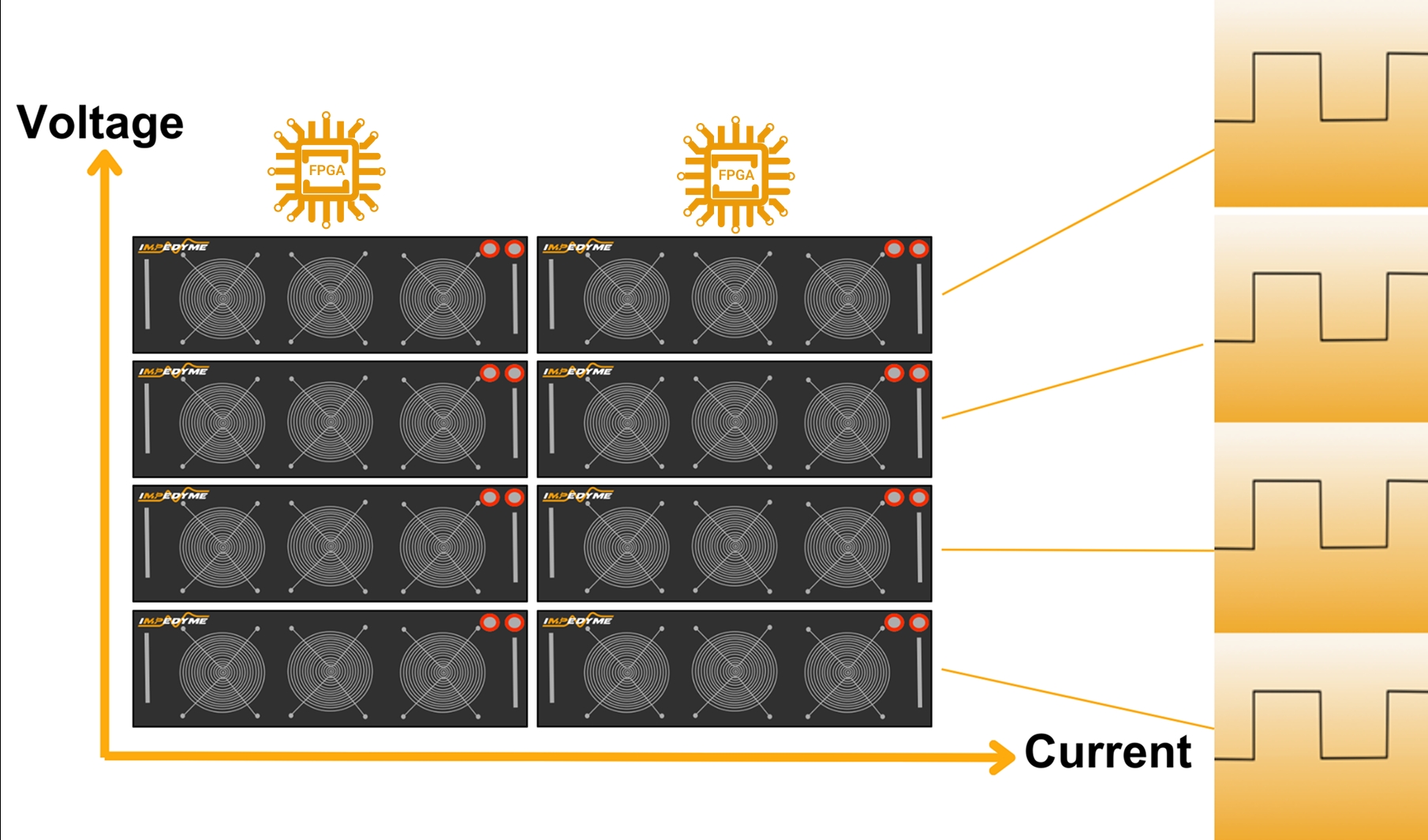
Impedyme CHP power module scalability for electrical and real-time simulation (Image courtesy of Impedyme)
The result is an affordable, multi-purpose device that can conduct both functional and performance tests. Even engineers who are only familiar with MATLAB and Simulink tools can be up and running with the Impedyme Power HiL solutions in no time. “Our vision is to provide an all-in-one Power HiL platform that is accessible to all hardware and software engineers, regardless of their level of HiL experience,” concludes Kan.
A Unified Software Ecosystem: PowerHIL Studio and Simulink Integration
Impedyme’s PowerHIL Studio integrates seamlessly with Simulink, enabling real-time control and scripting via MATLAB. Engineers can deploy models to FPGA-based real-time hardware, automate test sequences, and switch between motor emulator, grid emulator, and impedance analyzer modes all within one environment. This reduces development time and eliminates the need for manual reconfiguration, enabling a faster time-to-market.
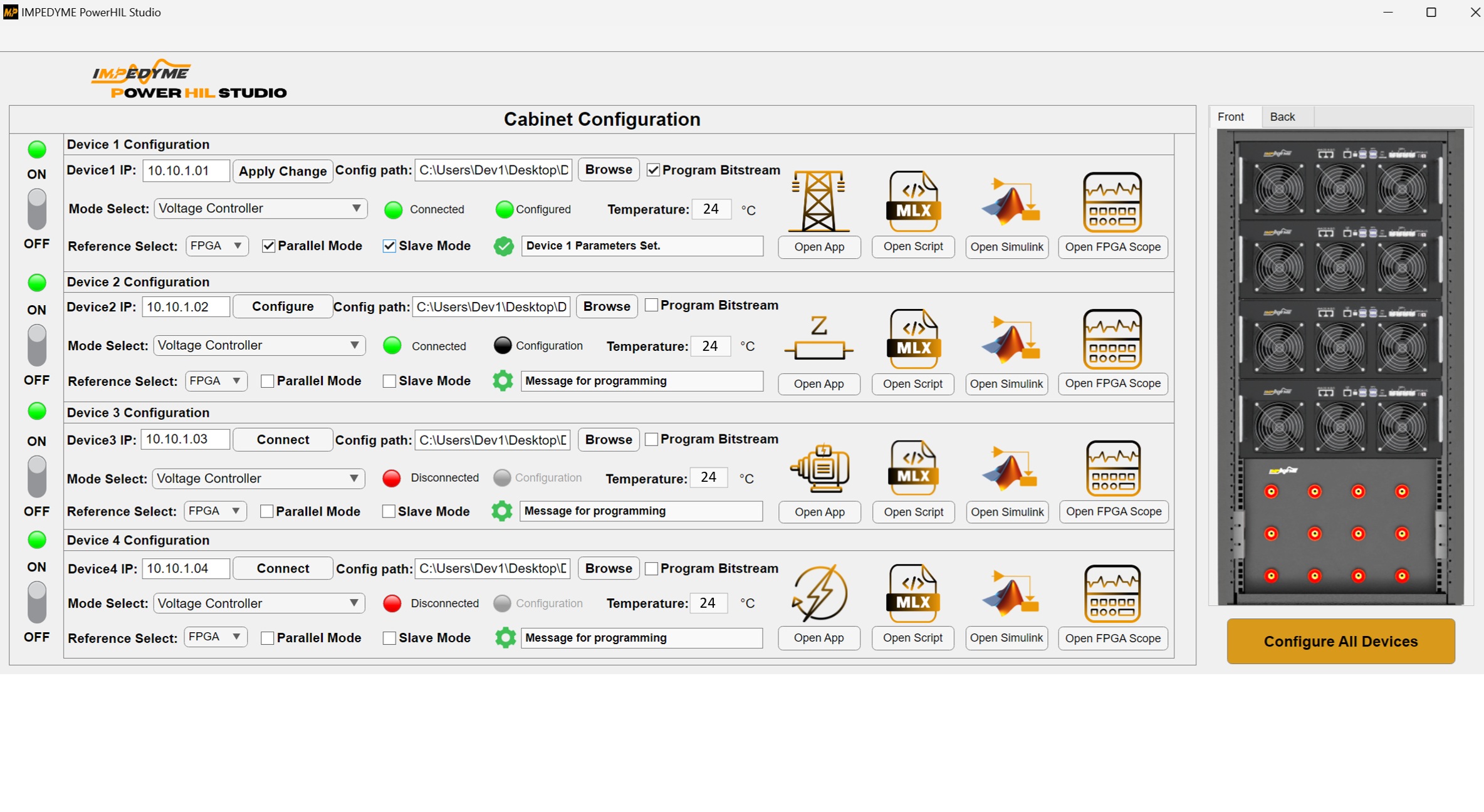
PowerHIL Studio software for cabinet configuration and FPGA bit-stream deployment (Image courtesy of Impedyme)
Motor Emulator for Inverter Testing and Validation
Impedyme’s Motor Emulator is a powerful real-time testing solution designed to revolutionize the development, validation, and deployment of inverter systems, particularly in the fields of electric mobility, renewable energy, and industrial automation. Built to support a wide range of motor types, including Permanent Magnet Synchronous Machines (PMSMs), Brushless DC Motors (BLDCs), and Induction Machines (IMs), the Motor Emulator simulates the realistic electrical and dynamic behaviors of physical motors under various load conditions. This enables customers to test inverters across a full range of operating scenarios without the need for a physical motor or mechanical setup. This virtualized approach to inverter validation dramatically reduces setup complexity, enhances lab safety, and accelerates development cycles.
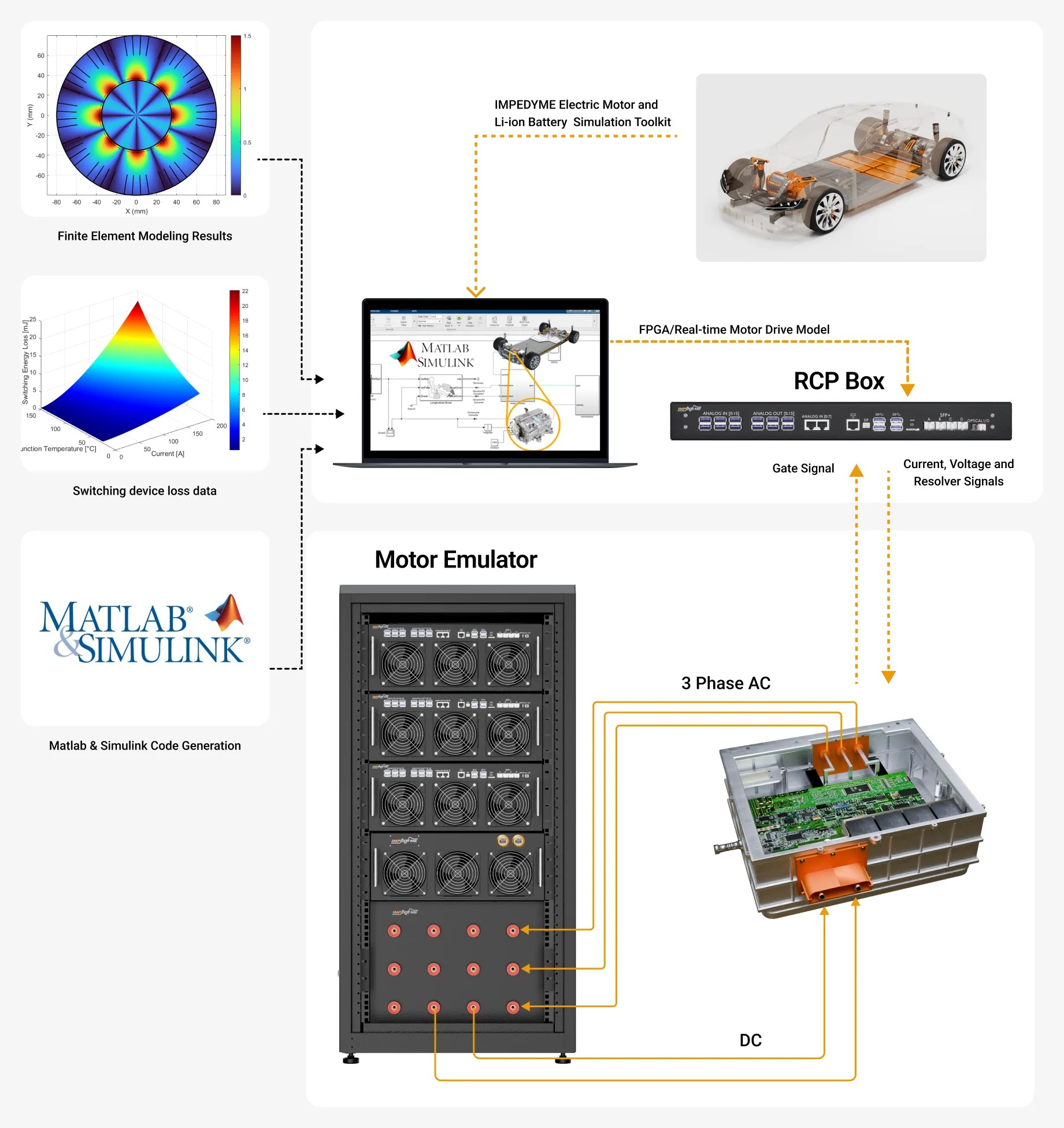
Motor Emulator and RCP Box Testing Platform control logic for validation and power testing (Image courtesy of Impedyme)
One of the core advantages of Impedyme’s Motor Emulator is its seamless integration with MATLAB and Simulink and Impedyme’s MotorSim Studio, allowing engineers to apply model-based design methodologies and automate test workflows. Parameters such as inductance, resistance, and inertia can be modified in real-time, enabling rapid testing across a wide range of motor profiles with just a few clicks. Engineers can also inject faults such as short circuits or sensor failures in a controlled environment, gaining insights into system robustness and fault-handling strategies. Whether testing a traction inverter for an EV or tuning a VFD for an HVAC system, Impedyme’s Motor Emulator offers a flexible, cost-effective, and high-fidelity alternative to physical motor testing – empowering innovation while reducing risk and development cost.

Impedyme’s motor emulator testbench deployed for the customer testing inverter (Image courtesy of Impedyme)
The Grid Emulator: Power Testing Meets Smart Grids
The CHP Grid Emulator is a regenerative grid simulation platform designed for PHIL and HIL scenarios. It enables validation of renewable integration, microgrid behavior, and inverter/grid-tied performance. The utility industry is heavily regulated, and adding new technology that touches the power grid must be rigorously tested and de-risked. With standards support like IEEE 1547, UL 1741, and IEC 61000, it meets the compliance needs of research labs and OEMs alike.
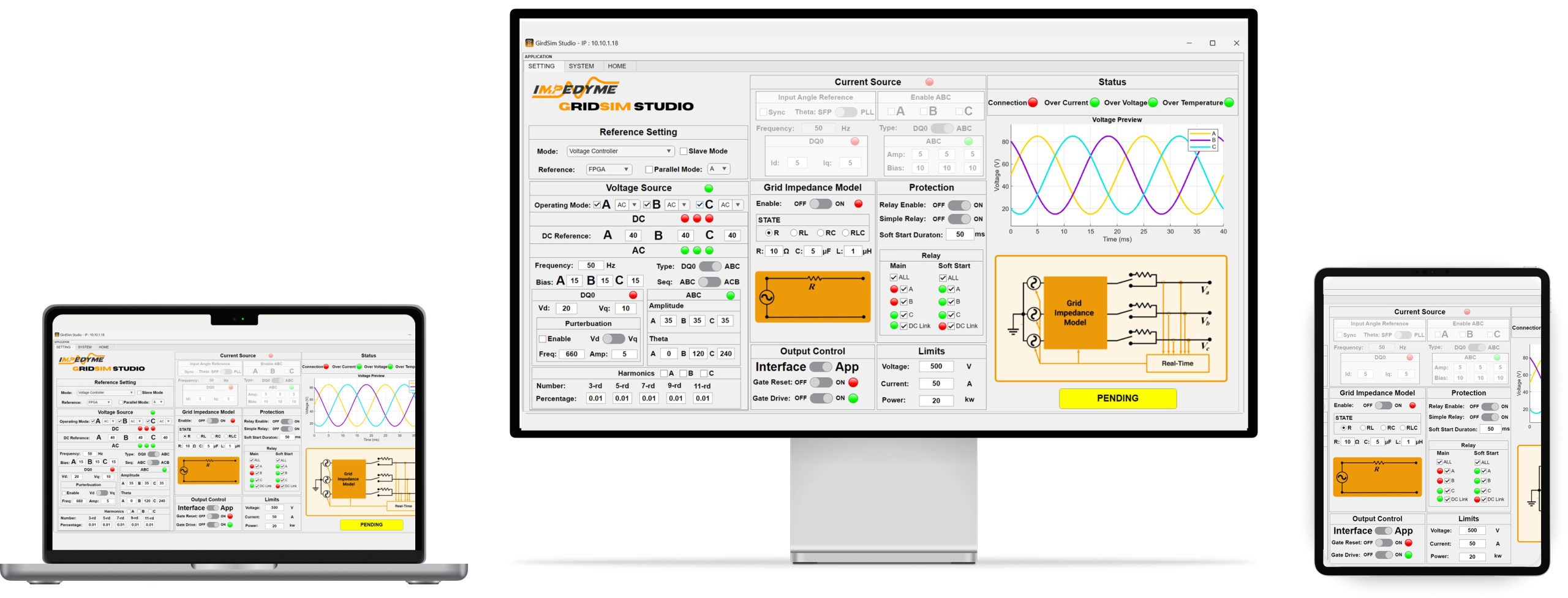
Impedyme’s GridSim Studio with intuitive graphical user interface designed to configure, operate, and visualize real-time grid emulation scenarios (Image courtesy of Impedyme)
From Simulation to Scalable Innovation
Impedyme’s partnership with MathWorks empowered them to harness the full range of MATLAB and Simulink capabilities from day one. “The MathWorks Startup Program eliminated the guesswork,” says Stavrou, “having access to MATLAB toolboxes and seamless integration saved months of development. Model-based design (MBD) in MATLAB and Simulink streamlines the entire product and code lifecycle by unifying requirements, design, implementation, and testing in a single model-driven workflow, enabling our team to deliver higher-quality products with reduced cost and time-to-market.”
Global Remote Access for Scaling Worldwide
Impedyme’s PHIL platform has robust support for global remote access and live demonstration, making high-power testing more accessible than ever. Through secure cloud-based connectivity, users can remotely operate the PHIL test bench to run simulations, modify system parameters, monitor waveforms, and even inject faults in real-time without needing to be physically present at the lab. This is especially valuable for OEMs, research institutions, and multi-site engineering teams who require flexible, location-independent access to test resources.
Before deployment, customers are often given remote access to a live system configured with their models or hardware under test, allowing them to validate functionality, explore features, and build confidence in the solution. Impedyme engineers can integrate any customer component, including inverters, converters, or protection relays, into the Power HiL testbench and showcase full-system behavior through a real-time interface. This approach accelerates decision-making, reduces commissioning timelines, and supports virtual training and collaboration, empowering organizations to innovate faster while minimizing travel and setup costs.
Looking Ahead: Impedyme’s Systems in Action
Impedyme’s products now span five continents, advancing their mission to democratize Combined HIL and Power (CHP) technology as an all-in-one solution. Impedyme supports a wide range of industries including EV, eVTOL, aerospace, marine, and renewable energy sectors such as wind, solar, and hydropower, with the goal of making advanced CHP systems accessible, affordable, and scalable, empowering innovators and researchers worldwide to accelerate breakthroughs in sustainable energy, transportation, and grid modernization.
Take a look at Impedyme’s emulation systems in action: https://www.youtube.com/watch?v=YMjE1vIy39I
To learn more about Impedyme, explore the products and request a live demo visit: https://impedyme.com
Learn more about MathWorks Startup Program: https://www.mathworks.com/products/startups.html
- Category:
- Startup Spotlights





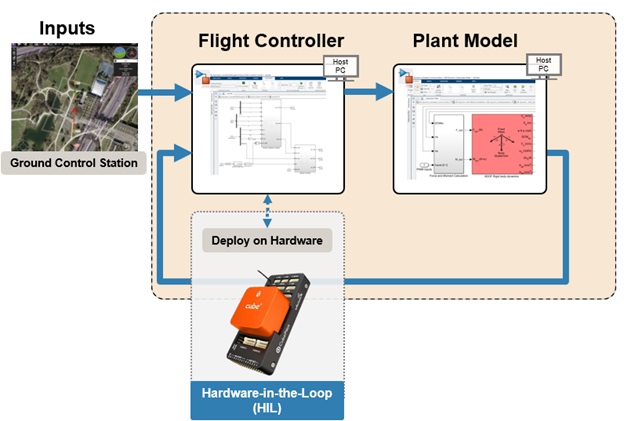



Comments
To leave a comment, please click here to sign in to your MathWorks Account or create a new one.